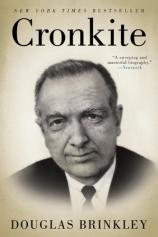Cronkite
Review
Cronkite
In his heyday, Walter Cronkite was adjudged the most trusted man in America. In this eponymous biography, masterfully offered by historian Douglas Brinkley, the reader learns that such an honor was not taken lightly by the veteran newsman. The author --- no relation to Cronkite’s “competitor” David Brinkley --- presents an amazing story not just of Cronkite, but of the evolution of news broadcasting in the early 20th century: first in print, then in radio, and finally in television.
"Anyone who grew up watching “Uncle Walter” on TV will appreciate Brinkley’s thorough biography of a broadcasting legend. And that’s the way it is."
Like many of his contemporaries, Cronkite got an early start, working for his school paper and paying his dues as a reporter with various news services as he honed his craft almost literally in the trenches during World War II. It was there that he came under the eye and mentorship of Edward R. Murrow, whom he one day would replace as CBS’ top anchor. Cronkite’s diligence and writing style set him apart from his fellow news hounds, and he received more assignments that would put him “up front” in the eyes, ears and minds of readers, listeners and viewers.
But there was more to Cronkite than his dogged approach to maintaining the highest of standards, which he did with aplomb. Presidents and other officials feared him --- not because he was mean-spirited, but because he had earned such trust from his audience. There’s no denying his influence on American history: his special reports from Vietnam alerting an American audience that the nation was mired in a war it could not win was a significant factor in President Lyndon Johnson’s decision not to seek reelection.
When Cronkite retired as the anchor of “CBS Evening News,” he left a void not just in the network, but in the industry as a whole. One can only wonder what he would think about cable stations (Fox News), programs (“Nancy Grace”) and “professionals” (Glenn Beck) who pass themselves off as providing news in a 24/7 society.
In a tome such as CRONKITE, one can expect to discover heretofore unknown issues that never would have come to light otherwise; such things were not discussed in more polite/discreet eras. But Cronkite, being an ordinary person in an extraordinary job, still suffered the frailties that make us all human (his emotional announcement that President Kennedy had died is a classic television moment). He had his crises of faith, his bouts with depression, and perhaps had a bit too much to drink from time to time. Brinkley also delves into Cronkite’s private life, to an unprecedented yet respectful degree. He was deeply in love with his wife Betsy; passionate about science (no one exceeded him in his fascination of and admiration for the U.S. space program); and unafraid to offer his opinion, whether requested or not.
Anyone who grew up watching “Uncle Walter” on TV will appreciate Brinkley’s thorough biography of a broadcasting legend.
And that’s the way it is.
Reviewed by Ron Kaplan on June 15, 2012
Cronkite
- Publication Date: May 21, 2013
- Genres: Biography, Nonfiction
- Paperback: 864 pages
- Publisher: Harper Perennial
- ISBN-10: 006137427X
- ISBN-13: 9780061374272





